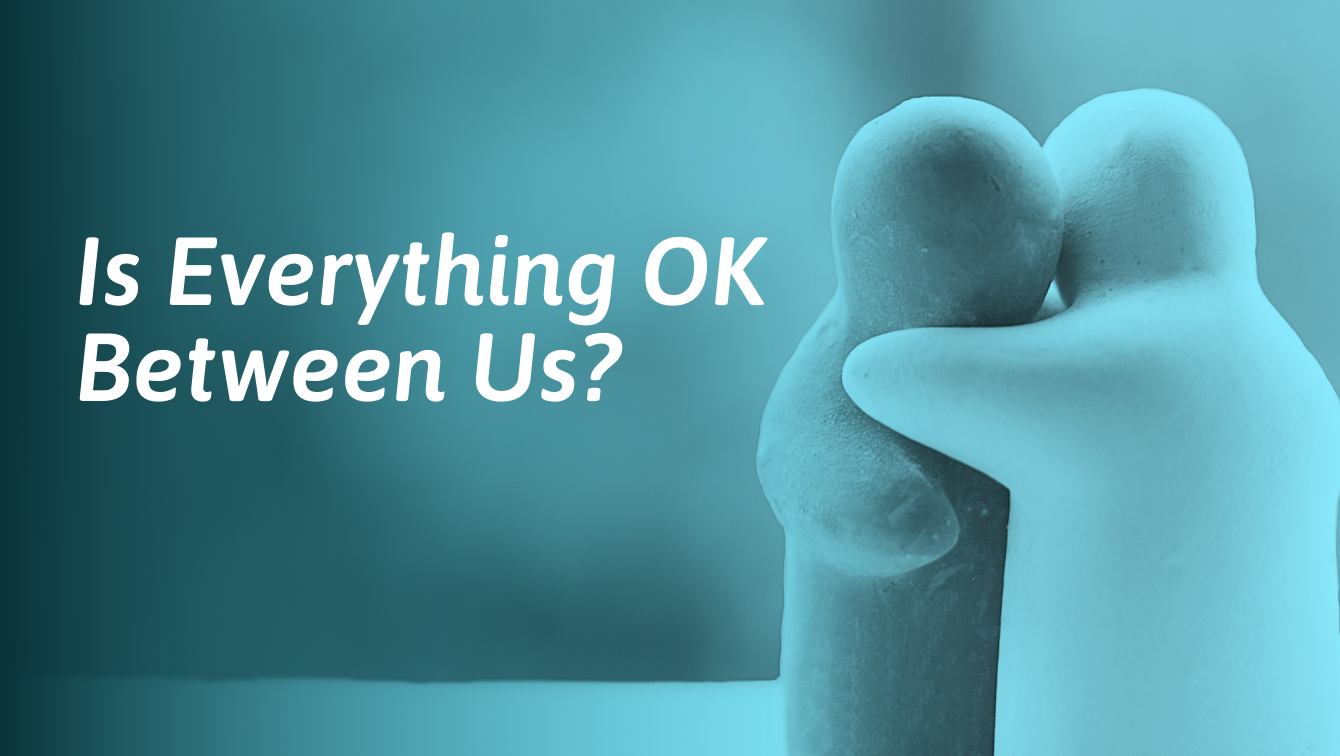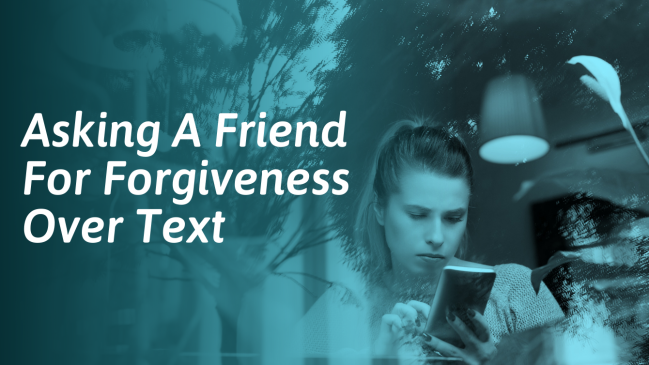“Recently, I’ve said some hurtful things to a friend, and I know she’s still upset. I feel awful and really want to apologize through text, but I’m not sure what to say. I don’t want to make things awkward or worse between us, but I know that I messed up.”
Apologies can be awkward and hard, but they also can help to repair hurt feelings and restore closeness and trust with a friend. If you’ve said or done something to a friend that you regret, or you’ve been neglecting your friendship, a sincere apology is the first step towards making things right. The specific kind of apology you need to give will depend on the situation.
This article will help you understand different kinds of apologies you can use, tips on when to use them, and will provide example quotes on how to word your apology.
Best ways to apologize to a friend
Not all apologies are created equally. Knowing the right and wrong way to apologize can help you craft a sincere apology that is most likely to be well-received. While it’s OK to send a cute or funny sorry message to a friend in some situations, more heartfelt apologies are needed when you’ve said or done something hurtful.
No one is perfect, and making a mistake or betraying a friend’s trust doesn’t need to mean the end of a friendship. A sincere apology is a good way to begin repairing a friendship and can sometimes even lead to a stronger, closer bond. The more serious the situation and the bigger your mistake, the more sincere your apology should be. These are often the hardest apologies to give but also the most important to repair and maintain close friendships.[1]
According to research, here are tips on the right way to apologize to a friend:[1][2][3][4]
- Apologize right after making a mistake, instead of letting a lot of time pass
- Give a sincere and heartfelt apology, rather than a half-hearted apology
- Be specific about what you’re apologizing for
- Take full responsibility for what you said or did
- Don’t cancel out your apology with a “but” or by giving excuses
- Don’t expect automatic forgiveness, especially when you’ve made a big mistake
- Demonstrate your sincerity by changing your behavior
10 sorry messages to send to a friend
The specific kind of apology you need to give and how you give it will depend on the situation, as well as the friendship itself. Below are 10 different ways to apologize to a friend, when to use this approach, and how to word your apology message.
1. Clarify whether an apology is needed
If you don’t know if your friend is upset or why they are upset, the first step is to check in and see if an apology is needed. Being direct and asking whether they are upset or what you did to upset them will help you get a clear understanding of the situation and how to repair it.
Examples of messages to get clarification:
- “Hey, is everything ok with us? Haven’t heard from you in a while.”
- “Got a weird vibe from you last time we talked. Did I do anything to upset you?”
- “Hey, I was thinking back to our conversation and am worried I might have said something to upset you?”
2. Be specific with your apology
If you know that you said or did something that upset your friend, the best course of action is to apologize to them. Specific apologies are often better than general or vague apologies because they identify the mistake that was made.[3][4] Use this approach when you know what happened, how it affected your friend, and what you need to apologize for.
Examples of specific apologies:
- “It was unfair of me to say _______ and I really regret it. I am so sorry.”
- “I should not have _______ and I just want you to know I am sorry and feel terrible about it.”
- “It wasn’t right for me to _______ and I just want you to know how sorry I am.”
3. Take full responsibility for your actions
If you did or said something you regret, make sure to take full responsibility instead of shifting blame or giving excuses. Taking full responsibility for your words and actions helps to make your apology more sincere, and is more likely to be well-received by your friend.[3][4]

Examples of taking responsibility:
- “There was no excuse for _______ and I accept complete responsibility. I am so sorry.”
- “I know that was wrong of me to _______ and hope you can forgive me.”
- “You needed me, and I’m really sorry for not being there for you. I should have _______.”
4. Apologize for the way something made them feel
In some situations, you may need to apologize when you didn’t actually say or do anything wrong. While you are not responsible for your friend’s emotions, apologizing for how something you said or did made them feel can help to protect the friendship.[1] Use this approach when you know your friend is upset but are sure you did not do anything wrong.
Examples of how to apologize for the way your friend feels:
- “Hey I just wanted to say I’m sorry you felt _______ and hope you know that I _______.”
- “I feel really bad that you felt _______ and want you to know that I would never _______.”
- “I am really sorry if I came across _______ or offended you in any way.”
5. Clear up misunderstandings
If there was a misunderstanding or honest mistake, it’s important to clear things up. Apologizing for being unclear while also clarifying what you meant to say or do can help to clear the air. Explaining your intentions, what went wrong, or how the mistake happened can help to strengthen your apology when a misunderstanding occurs.[3]
Examples of clarifying your intentions:
- “I am really sorry if what I said came across _______. What I was trying to say was _______.”
- “I’m sorry if there’s been any misunderstanding and wanted to make sure you knew that _______.”
- “Hey, I’m really sorry if I was unclear in any way. What I meant was _______.”
6. Ask how you can make things right
Another good way to say you are sorry to a friend who is upset with you is to ask them what you can do to restore trust and make things better. Acknowledging you messed up and expressing a desire to make things proves that you value your friendship and opens the door to repairing the damage. This can also help strengthen your apology and make it more sincere.[3]
Examples of asking how to make things right:
- “I know you’re still feeling hurt. Is there anything I can do to make you feel better?”
- “I really want to make things better. What can I do to start?”
- “Is there anything I can do to make this up to you?”
7. Commit to changing your behavior
The words “I’m sorry” are only sincere when they are backed up by a lasting change in your behavior. Be specific about what you will do or say differently next time, and make sure to only promise something when you are 100% sure you can keep this promise. This is called restitution and is an important way to demonstrate your remorse.[3]
Examples of committing to change:
- “I am so sorry for _______. I am going to make a point to _______ .”
- “I’m sorry for not being a good friend to you recently. I promise to _______.”
- “I feel really bad about _______ and hope you can forgive me. I promise to be better about this in the future.”
8. Express sincere remorse
An insincere apology can be even worse than no apology at all.[5] Remorse is what makes an apology sincere and involves emotions like guilt, sadness, or regret.[1][3][4] Make sure that your apology message conveys these emotions, especially when you made a big mistake. The more damage was done to the friendship, the more remorse is necessary to fix it.
Examples of showing remorse:
- “I feel terrible about _______. I really hope that you’ll give me a chance to make it up to you.”
- “I have felt so bad about _______. I know you really needed me to _______ and I’m so sorry I wasn’t supportive.”
- “I have not been able to stop thinking about _______. I feel so bad and just want you to know that _______.”
9. Give them space and then follow up
Don’t expect an immediate reply from a friend when you send an apology message, and understand that they may need some time and space before they respond. Even if they do respond, it can still take time for them to forgive you, so be patient with them.
Examples of how to follow up after apologizing:
- “Hey, I just wanted to check in and see if you had time to look at my message. I know you’re really busy but haven’t heard back from you and just wanted to make sure you got my message.”
- “Just checking in to see if you’ve thought any more about _______. I’d love to see you in person to chat more sometime soon, so feel free to reach out when you have time.”
- “I know I really hurt your feelings, and I’m not expecting things to be better overnight, but I’m here whenever you feel ready to chat.”
10. Let them know you care about them
When you’ve said or done something to hurt or betray trust with a close friend, it’s important to let them know you care about them, their feelings, and their friendship. Including this in your apology message can be a great way to rebuild trust and closeness with a friend.

Examples of how to demonstrate you care:
- “I just wanted to let you know how important you are to me and that I feel so bad about _______. Please let me know what I can do to make things right with you.”
- “You are one of my best friends, and I never want to make you feel _______. I am so sorry if I did and am willing to do whatever it takes to make things right with us!”
- “I hope you know that I really care about you and only want the best for you. I know I really hurt your feelings and betrayed your trust, and I feel awful about it.”
You might also find these examples of thank you messages to friends helpful.
Final thoughts
Apologies are a great way to begin mending broken trust or hurt feelings with a friend. If you’ve said or done something you regret, make sure to issue a sincere apology to them, and don’t wait to reach out. Apologies are a first step towards repairing trust and closeness, and protecting your friendship, but their forgiveness may take time. Be willing to have open discussions with your friend, and prove you’re sorry by making changes to your behavior.
Common questions
Here are answers to some of the most common questions people have about apologizing to a friend via email or text messages.
How do I get my best friend to forgive me over text?
Sending a sincere apology note via text is a good start, but you may need to follow up with a phone call or in-person conversation, especially if you said or did something very hurtful. Ultimately, you cannot control your friend’s response, and sometimes even the best apologies aren’t accepted.
How do you prove you are sorry?
Saying you’re sorry doesn’t mean much unless you show sincere remorse. It’s also important to make changes to your behavior to prove that you feel bad about what you did and won’t make the same mistake again.
How do you indirectly say you’re sorry?
Apologies that don’t directly address a problem can seem insincere, so they aren’t always the best approach. If you didn’t do anything wrong and a direct apology wouldn’t be appropriate, you can still apologize for the way your friend feels or for how your words or actions affected them.




I am sorry too
This was the best way to make my friend happy.
I and a particular guy were bffs.until another girl jokingly told him that i was dating his brother.he is still mad at me and whenever i try to apologise i feel shy and lack courage.pls wat should i do
I talked to my friend brother about something that his brother said and he found out and is pisses off with me and.dont know why I am afraid to apologize what should I do
my friend is mad at me for something i dont know wht should i do i tried apologizing alot of times but he doesnt listen can u pls tell me wht to do
You Will Just Continue Begging and Give Him A Small Space
This worked! My friend was mad but when I sent the apology she apologized too! but we r giving each other time rn and we will talk soon! thx soo much
I tried most of them. making them in my own way tho.
She came online. and back to offline. several times as I sent each essay.
I’m not getting a response.
should I try anymore?
If she keeps coming online and offline she is thinking about forgiving you. If you made them as heartfelt as possible just send one more thing ” I know you are still mad. When you are ready to talk I am here. Goodbye ______”
I accidentally said something about another friend when she wasn’t there- and other friends recently found out and aren’t exactly pleased about it. Does anyone have any advice? Thanks
Own up to what you said first and then apologize. If the person finds out then apologize to her/him and promise not to talk about anyone behind their back again. Good luck.
what do I do if I backstabbed them? and I wanna mend our relationship?
Hi,
My goddaughter overheard me expressing my feelings about the way she hurt me to another person over the phone. I apologized and asked for forgiveness but her response was “Leave me alone don’t talk to me!”
THIS IS NOT WORKING FOR ME
Oh my gosh
this helped alot with me and my bff
#4 is dumb.
if the feeling isn’t attached to your action, there is no point. You can do something that is perceived to cause a reaction but apologizing for their feelings is lame and bad.
Ok that cool
I am so sorry